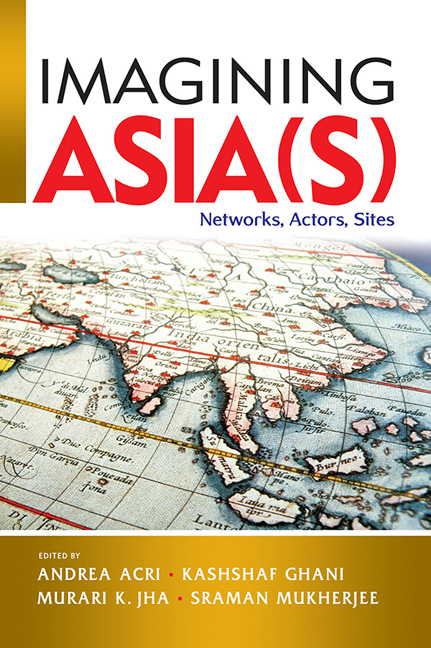Book contents
- Frontmatter
- Contents
- List of Contributors
- Introduction
- Part I Conceptualizing the Region: Past and Present
- Part II Conceptualizing Asia through the Prism of Europe
- Part III Networks of Knowledge Across the Indian Ocean
- Part IV Histories and Geographies of Pilgrimage in Asia
- Part V Trans-Local Dynamics and Intra-Asian Connections across Space and Time
- 10 Sanskritic Buddhism as an Asian Universalism
- 11 Interconnectedness and Mobility in the Middle Ages/Nowadays: From Baghdad to Chang'an and from Istanbul to Tokyo
- 12 Connecting Networks and Orienting Space: Relocating Nguyen Cochinchina between East and Southeast Asia in the Sixteenth and Eighteenth Centuries
- 13 The Highlands of West Sumatra and their Maritime Trading Connections
- Index
11 - Interconnectedness and Mobility in the Middle Ages/Nowadays: From Baghdad to Chang'an and from Istanbul to Tokyo
from Part V - Trans-Local Dynamics and Intra-Asian Connections across Space and Time
Published online by Cambridge University Press: 31 January 2020
- Frontmatter
- Contents
- List of Contributors
- Introduction
- Part I Conceptualizing the Region: Past and Present
- Part II Conceptualizing Asia through the Prism of Europe
- Part III Networks of Knowledge Across the Indian Ocean
- Part IV Histories and Geographies of Pilgrimage in Asia
- Part V Trans-Local Dynamics and Intra-Asian Connections across Space and Time
- 10 Sanskritic Buddhism as an Asian Universalism
- 11 Interconnectedness and Mobility in the Middle Ages/Nowadays: From Baghdad to Chang'an and from Istanbul to Tokyo
- 12 Connecting Networks and Orienting Space: Relocating Nguyen Cochinchina between East and Southeast Asia in the Sixteenth and Eighteenth Centuries
- 13 The Highlands of West Sumatra and their Maritime Trading Connections
- Index
Summary
Here is the Tigris with nothing between us and China, and on it arrives everything that the sea can bring.
Al-Tabarī, History, vol. XXVIIIINTRODUCTION
The mapping of the active networks of circulation and exchange in Eurasia during the Middle Ages would make easier the comparison between cultural systems which, although different among them, were not kept in sealed boxes. This is certainly the case of the Abbasid Caliphate of Baghdad and Tang China. Chang'an and Baghdad were at that time two of the largest cities in the world, marked by strong rule, successful diplomatic relationships, economic expansion, and a cultural efflorescence characterized by a cosmopolitan style. A comparative methodology allows to effectively describe both entanglements and contacts among artistic and architectural practices belonging to different cultural systems that appear distant on the geographic chart, but are actually much closer than originally thought. The case of Tang China is particularly evident through the adoption of Central Asian fashion and customs at the court of Chang'an. Similarly relevant is the appreciation for Chinese porcelains at the Abbassid court, which would eventually lead to the production of local imitations and adoptions of new patterns and shapes. The adoption of models moving within the broad borders of Asia is very relevant to our days. If trade is what unites the modern global system and Asia is the focal point of the new century, this phenomenon cannot be understood without searching in the past for a similar phenomenon of interconnectedness and mobility of objects, workers, written texts, and ideas. Bentley (1996, p. 752) maintains that in the discourse of cross-cultural interactions in premodern times there are three kinds of processes which had significant repercussions across the boundaries of societies and cultural regions: mass migrations, campaign of imperial expansions, and long-distance trade. Different interactions between the Mediterranean and Asia are here presented following a chronological order, focusing in particular on how trade and trade diaspora communities played an important role to facilitate the transportation and exchange of commodities and at the same time served as avenues of diffusion of technology and also religious beliefs in both premodern and modern societies. In fact the selected case studies show how long-distance trade has contributed to the diffusion of Islam to China under the Tang dynasty (618–907) and in Japan under the Taishō (1912–26) and early Shōwa (1926–89) eras.
- Type
- Chapter
- Information
- Imagining Asia(s)Networks, Actors, Sites, pp. 334 - 357Publisher: ISEAS–Yusof Ishak InstitutePrint publication year: 2019



